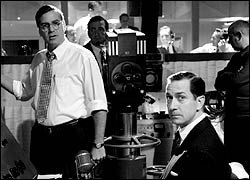 Good Night, and Good Luck
Good Night, and Good Luck (Dir: George Clooney, 2005)
Considering Hollywood's supposed crypto-Stalinist bias, it's a little odd that there have been so few movies about McCarthyism. Sure, lots of films have touched on the subject, in the context of the suffocating conformity of the Eisenhower years, but the only one I can recall that plonked the subject in the centre of the action was Martin Ritt's The Front (1976), starring Woody Allen as a cashier who acts as a stooge for the work of blacklisted writers. Now seems as good a time as any to offer a more serious telling of the tale, especially with toxic right-wing fruitcake Ann Coulter telling anyone who'll listen that McCarthy was one of the good guys.
But Good Night, and Good Luck doesn't quite do that. Oh sure, McCarthy's puffy, sweaty face is all over the place, haranguing, sneering, quoting Shakespeare, in contrast with the glacial David Strathairn as Ed Murrow, all etched concern and impassive gazes into the distance. But it's not really a film about witch-hunts.
Because McCarthy isn't portrayed by an actor, the opposition and obstruction that Murrow encounters is presented in the form of his bosses William Paley (Frank Langella) and Sig Mickelson (Jeff Daniels). And their objections aren't based on politics; it's simple economics. "People want to enjoy themselves," says Paley, pointing out that The $64,000 Question raises more ad revenue, at a third of the cost of Murrow's earnest probing. "Did you know that the most trusted man in America is Milton Berle?" asks producer Fred Friendly (George Clooney). Even Murrow knows the score. When told his ratings are good, his response is a rueful "Right up there with Howdy Doody."
Because this movie is essentially about television, and more generally about all mass media. The McCarthy hook is simply a means of showing one way that TV can be used, for the greater good. But even a cathode-ray saint like Murrow is tainted by association with the brutal truth of ratings. When he's not stitching up "the junior Senator from Wisconsin", as McCarthy is regularly described, he's asking Liberace when he's going to get married, colluding in the showbiz smokescreen (and, God, is there a lot of smoke in this movie). Strathairn plays him as stiff, slightly pious, even dull, when compared to the likes of Clooney and Robert Downey, Jr. Only when the TV camera light comes on does he spring into life. He is a creature of TV, with all the good and bad of the medium in his DNA. And he knows that if the punters have to choose an Ed, they'll choose Sullivan, not him.
The format is consciously old-fashioned and self-referential, right down to the quasi-Brechtian use of jazz standards (sung by the magnificent Dianne Reeves) to counterpoint the action. It's shot in black and white, in a clunky flashback format that has the action bookended by Murrow's 1958 speech to his industry colleagues. But when Strathairn points out that, without the diligence and conscience of professionals, television is "merely wires and lights in a box", it's not the cinema having a supercilious dig at television, like some of the movies that responded fearfully to the new medium in the 1950s. After all, the simple fact that this movie is nominated for an Oscar, while the real big box-office monsters aren't, demonstrates that the art/commerce dialectic is buzzing as much on the big screen as it is in TiVoLand. Idiot media has come a long way since Liberace searched for a nice girl to take home to mother - and yet it remains pretty much the same. The keynote of Good Night, and Good Luck is the whole of showbiz looking in on itself, with a deeply Murrowed brow.

No comments:
Post a Comment